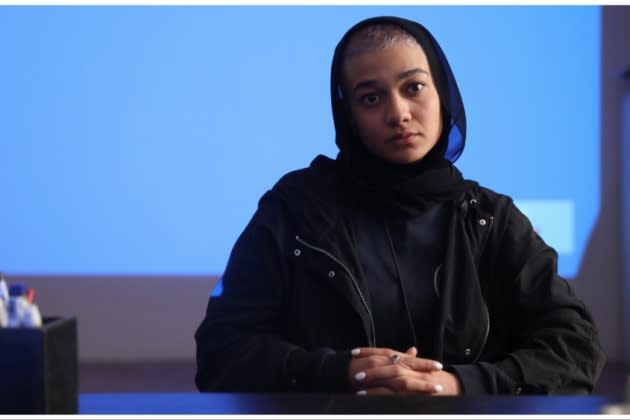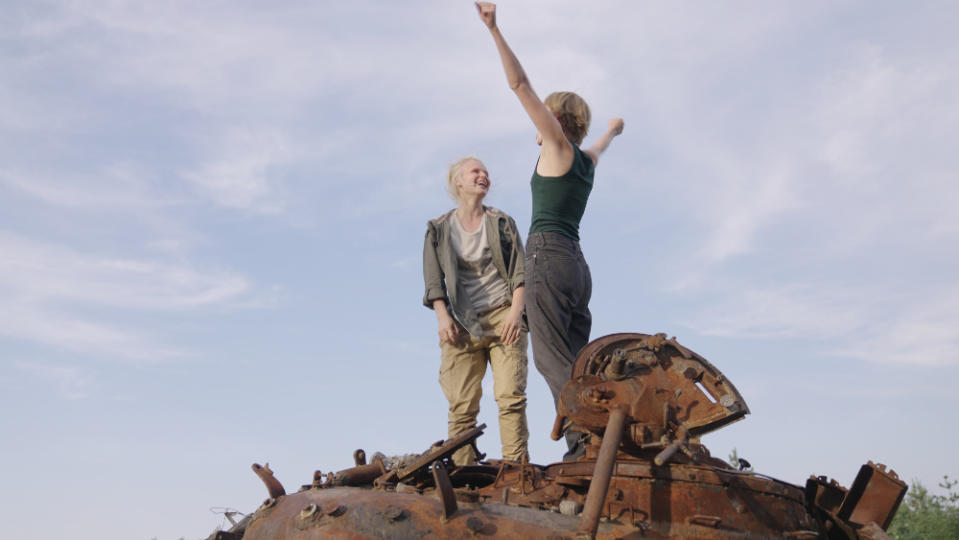Ukraine War, Iranian Uprising Cast Long Shadow Over Cannes Film Festival

The ongoing Russia-Ukraine war and the momentous burst of rebellion against the Iranian regime prompted by the death of Mahsa Amini are reverberating profoundly at the Cannes Film Festival.
At the festival’s opening ceremony on Tuesday night, legendary French actress Catherine Deneuve paid tribute to the war’s victims by reciting a poem from Ukrainian poet Lessia Oukraïnka, solemnly declaring: “I no longer have either happiness or freedom, only one hope remains to me: to return one day to my beautiful Ukraine.” One year ago, Cannes got off to an emotional start with remarks from Ukrainian President Volodymyr Zelenskyy.
More from Variety
On the industry side, official Russian delegations and companies with ties to the government are again banned from participating in the Cannes Marché du Film. And Iran’s Farabi Film Foundation, the top national film entity which has been attending the market for years, has not been allowed to book a stand, a festival spokesperson confirmed.
Iran will instead be repped by the Iranian Independent Filmmakers Assn., founded in September 2022 by Kaveh Farnham, the Dubai-based producer of dissident director Mohammad Rasoulof’s “There Is No Evil.”
Significantly, Rasoulof, who was recently released from Tehran’s Evin prison, was not allowed to leave Iran to serve on Cannes’ main jury, he recently confirmed.
In terms of the official selection, Ukraine is understandably absent due to the war. After a flurry of titles filmed before the Russian invasion hit the festival circuit last year — including Dmytro Sukholytkyy-Sobchuk’s Cannes Directors’ Fortnight selection “Pamfir” and Maksym Nakonechnyi’s Un Certain Regard player “Butterfly Vision” — the well has largely dried up.
“The industry, as an industry, is dead for the moment,” said Vladimir Yatsenko, who produced Antonio Lukich’s “Luxembourg, Luxembourg,” which premiered in the Venice Film Festival’s Horizons strand last summer.
Funding for the Ukrainian State Film Agency, the industry’s main financing body, has been diverted toward the war effort. Many male filmmakers are serving on the frontlines — Yatsenko himself just returned to Kyiv the day before he spoke to Variety.
Despite the challenges, Variety understands that several Ukrainian films were submitted to the festival but didn’t make the official selection, although Polish director Maciek Hamela’s war documentary “In the Rearview” — a minority Ukraine co-production — was selected for the festival’s ACID sidebar. (The sole Russian entry, Ilya Povolotsky’s “Grace,” was filmed before the Ukraine invasion and selected for Director’s Fortnight.)
Meanwhile, “Two Sisters,” a Ukraine-Poland co-production directed by Łukasz Karwowski, is currently in post-production and will be presented in the Tallinn Black Nights Goes to Cannes works-in-progress showcase. Filmed over six weeks in Ukraine late last summer, it’s one of the first narrative features to go into production since the start of the war. “We were working very fast,” said Karwowski, whose small, nimble crew had to navigate a barrage of military checkpoints and filmed while Russian artillery burst in the air.

Iran, meanwhile, is repped by only one film, timely underground drama “Terrestrial Verses,” co-directed by Canada-based Alireza Khatami and Iran-based Ali Asgari, premiering in Un Certain Regard. Shot in Tehran without a permit after the Mahsa Amini movement started, “Verses” consists of 12 tableaus depicting the increasingly absurd and tragic plight that Iranians face in their everyday life with a scathingly ironic deadpan tone. “It was very important for us to talk about the system, about the totalitarian system that wants to control everything in people’s lives,” said Asgari.
As Mohammad Attebbai, who is head of Tehran-based sales company Iranian Independents, points out, the bulk of the Iranian films that have surfaced on the festival circuit since Amini’s death are either by Iranian diaspora directors, such as native New Yorker Maryam Keshavarz’s “The Persian Version,” which bowed at Sundance, or underground films like “Verses.” And those, due to the turbulence, are a rarity right now.
“Iranian cinema in the past six, eight months hasn’t had time to catch up,” said Khatami, who believes that “cinema in Iran will be divided into a before and after [the Mahsa Amini movement].”
But Attebbai underlines that Iran’s well-known directors who are still living there — unlike Asghar Farhadi, who left Iran last September and currently divides his time between Los Angeles and Europe — have put moviemaking on hiatus at the moment both “due to all the limitations and restrictions imposed on filmmakers” by the regime, and also because they feel that this is not the right time to make a film. “They simply cannot reflect what’s happened and is happening in society,” he said.
As for Ukraine, the Cannes Market will again put its muscle behind a range of efforts to support the beleaguered industry, including a Ukraine in Focus event that will present 10 feature film projects in development to potential co-producers and financiers. Ukrainian filmmakers, meanwhile, are lobbying European funding bodies to amend their guidelines for international co-productions and allow them to apply without domestic financing secured — a step that could keep the production pipeline flowing as the country continues to defend its sovereignty.
“There’s a lot of people trying to keep the industry alive,” said Artem Koliubaiev, head of the Council for State Support for Cinematography of Ukraine, a key funding body. The veteran producer was among the industry representatives who met with President Zelenskyy in March to stress the urgency of getting government financing back on track. “We need to show to the world and to international partners that we believe in our industry and that we are ready to start the process of funding and shooting in our country,” Koliubaiev said.
“We don’t know if we will succeed in the end. But we have this instinct — not only of survivors, but fighters,” said Aleksandra Kostina, of Kyiv-based Bosonfilm (“Pamfir”), who has two projects in the Cannes Marché’s Ukraine in Focus program. “We know what is precious for us and we are ready to fight for it.”
Best of Variety
Tony Predictions: Best Musical -- Four Stand Poised to Give ‘Kimberly Akimbo’ Some Competition
This 'Fast and Furious' Arcade Cabinet Allows You to Step Behind the Wheel as Dom Toretto
Sign up for Variety’s Newsletter. For the latest news, follow us on Facebook, Twitter, and Instagram.


